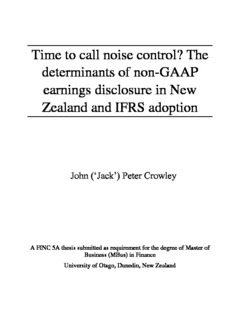| dc.contributor.advisor | Lont, David | |
| dc.contributor.author | Crowley, John (Jack) Peter | |
| dc.date.available | 2016-01-27T19:34:42Z | |
| dc.date.copyright | 2016 | |
| dc.identifier.citation | Crowley, J. (Jack) P. (2016). Time to call noise control? The determinants of non-GAAP earnings disclosure in New Zealand and IFRS adoption (Thesis, Master of Business). University of Otago. Retrieved from http://hdl.handle.net/10523/6186 | en |
| dc.identifier.uri | http://hdl.handle.net/10523/6186 | |
| dc.description.abstract | I hand-collect non-GAAP earnings disclosures made by New Zealand firms to consider whether the characteristics of disclosers are consistent with informative or opportunistic (turning up the noise) disclosure incentives. I find evidence that both types of incentives are important. Commentators frequently suggest that firms informatively disclose non-GAAP earnings because IFRS fails to adequately capture underlying performance. I find that IFRS is associated with an increased probability of non-GAAP earnings disclosure; and an increased probability that disclosers will provide high-quality reconciliations, whereas opportunistically-linked firm characteristics are negatively associated with reconciliation quality. One interpretation is that this corroborates commentators’ arguments. The Financial Market Authority provides guidance on the best disclosure practices; however, I fail to find evidence that opportunistically-linked firm characteristics are less likely to shape non-GAAP disclosure after the introduction of this guidance. Conversely, this guidance is positively associated with reconciliation quality which could imply that some latent reduction in opportunism has occurred. Some informatively-linked firm characteristics are positively associated with reconciliation quality, while others are negatively associated. Evidence suggests that the emphasis placed on non-GAAP earnings is a function of both informativeness and opportunism. This suggests that any regulatory restrictions constraining the disclosure or emphasis of non-GAAP earnings or demanding high-quality reconciliations (‘calling noise control’) would be likely to restrict the practices of both informative and opportunistic disclosers. Lastly, while there is limited evidence that the decision to disclose well-defined, commonly-used non-GAAP earnings metrics (EB metrics) has the potential to be opportunistically motivated, evidence suggests these measures are opportunistically emphasised. This warrants concern about the use of all forms of non-GAAP earnings. | |
| dc.format.mimetype | application/pdf | |
| dc.language.iso | en | |
| dc.publisher | University of Otago | |
| dc.rights | All items in OUR Archive are provided for private study and research purposes and are protected by copyright with all rights reserved unless otherwise indicated. | |
| dc.subject | non-GAAP earnings | |
| dc.subject | IFRS | |
| dc.subject | New Zealand | |
| dc.title | Time to call noise control? The determinants of non-GAAP earnings disclosure in New Zealand and IFRS adoption | |
| dc.type | Thesis | |
| dc.date.updated | 2016-01-27T08:06:11Z | |
| dc.language.rfc3066 | en | |
| thesis.degree.discipline | Accounting & Finance | |
| thesis.degree.name | Master of Business | |
| thesis.degree.grantor | University of Otago | |
| thesis.degree.level | Masters | |
| otago.openaccess | Open | |
| dc.identifier.wikidata | Q112923824 | |
| otago.wikidata.url | https://www.wikidata.org/wiki/Q112923824 | |

